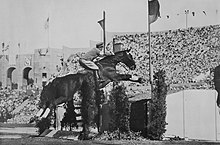| Individual jumping at the Games of the X Olympiad | |||||||||||||
|---|---|---|---|---|---|---|---|---|---|---|---|---|---|
 Takeichi Nishi, the gold medalist, competing Takeichi Nishi, the gold medalist, competing | |||||||||||||
| Venue | Los Angeles Memorial Coliseum | ||||||||||||
| Date | 14 August 1932 | ||||||||||||
| Competitors | 11 from 4 nations | ||||||||||||
| Winning total | 8 penalties | ||||||||||||
| Medalists | |||||||||||||
| |||||||||||||
| ← 19281936 → | |||||||||||||
| Equestrian events at the 1932 Summer Olympics | ||
|---|---|---|
 | ||
| Dressage | individual | team |
| Eventing | individual | team |
| Jumping | individual | team |
The individual show jumping in equestrian at the 1932 Summer Olympics in Los Angeles was held on 14 August. The event was called the "Prix des Nations" at the time. There were 14 competitors from 4 nations.
The difficulty of transporting horses between Europe and Los Angeles meant that only one European nation, Sweden, participated. The team competition was decided by summing the scores of each nation's three riders in the individual competition. While individual medals were awarded, none of the teams managed to have three riders finish the course so team medals were not awarded. The 18-obstacle, 20-effort course was 1,060 meters in length, and included two fences at 1.60 meters, a very difficult wall, and a water that was 5 meters in width. 100,000 spectators were present at the show jumping competition. The event was won by Takeichi Nishi of Japan, the nation's first medal in individual jumping. The United States also earned its first medal in the event, with Harry Chamberlin's silver. Clarence von Rosen, Jr. put Sweden on the podium for the first time since 1920 with his bronze.
Background
This was the sixth appearance of the event, which had first been held at the 1900 Summer Olympics and has been held at every Summer Olympics at which equestrian sports have been featured (that is, excluding 1896, 1904, and 1908). It is the oldest event on the current programme, the only one that was held in 1900.
Two riders from the 1928 competition returned: eighteenth-place finisher Harry Chamberlin of the United States and twenty-fifth-place finisher Ernst Hallberg of Sweden.
Mexico made its debut in the event. Sweden competed for the fifth time, the most of any nation competing and tying Belgium and France for most of any nation; Sweden had missed only the inaugural 1900 competition, while Belgium and France were missing the individual jumping for the first time in 1932.
Competition format
The course, designed by former American competitors John Burke Barry and Sloan Doak, was 1060 metres long with 18 obstacles (20 jumps). The maximum height of the jumps increased from 1.4 metres in previous editions to 1.6 metres in 1932; the long jumps increased from 4 metres to 5 metres. This resulted in a "brutally difficult" course that eliminated six of 11 riders.
A single run was held, with the rider with the fewest faults winning.
Schedule
| Date | Time | Round |
|---|---|---|
| Sunday, 14 August 1932 | 14:30 | Final |
Results
Only five of the riders finished the course, with each of the other six disqualified for having three refusals. The Mexican team was eliminated before the halfway mark (Mejia on jump 2, Bocanegra on jump 5, and Ortíz on jump 8). The tenth jump claimed two pairs, Francke and Imamura. Wofford made it the furthest of the eliminated riders, reaching the third refusal on jump 11.
Von Rosen rode early and took the lead with 16 faults. Chamberlin bettered that with 12. Nishi was the final rider; he took the course slower than the others (incurring a 1-point time penalty) and finished with only 7 jumping penalties, giving him a total of 8 penalties and the gold medal.
| Rank | Rider | Horse | Nation | Penalties | ||
|---|---|---|---|---|---|---|
| Jump | Time | Total | ||||
| Takeichi Nishi | Uranus | 7 | 1 | 8 | ||
| Harry Chamberlin | Show Girl | 12 | 0 | 12 | ||
| Clarence von Rosen, Jr. | Empire | 16 | 0 | 16 | ||
| 4 | William Bradford | Joe Aleshire | 24 | 0 | 24 | |
| 5 | Ernst Hallberg | Kornett | 37 | 13.5 | 50.5 | |
| — | Andrés Bocanegra | El As | DNF | DNF | DNF | |
| Arne Francke | Urfe | DNF | DNF | DNF | ||
| Yasushi Imamura | Sonny Boy | DNF | DNF | DNF | ||
| Carlos Mejia | Kanguro | DNF | DNF | DNF | ||
| Procopio Ortíz | Pinello | DNF | DNF | DNF | ||
| John William Wofford | Babe Wartham | DNF | DNF | DNF | ||
References
- Evans, Hilary; Gjerde, Arild; Heijmans, Jeroen; Mallon, Bill; et al. "Equestrianism at the 1932 Los Angeles Summer Games: Men's Jumping, Individual". Olympics at Sports-Reference.com. Sports Reference LLC. Archived from the original on 18 April 2020. Retrieved 16 April 2020.
- Official Olympic Report Archived 2 August 2012 at the Wayback Machine, la84.org. Retrieved 5 August 2018.
- ^ "Jumping, Individual, Men". Olympedia. Retrieved 16 February 2021.
- Wallechinsky, David (1984). The Complete Book of the Olympics. England: Penguin Books. p. 228. ISBN 0140066322.
- ^ Official Report, p. 725.
- Official Report, p. 712